Henry Not Sweating Thoughts of Another 2,000

NASHVILLE – Derrick Henry has a one-track mind. It does not take him anywhere near a second straight 2,000-yard season.
Work hard. Get better.
One or both of those phrases were a part of nearly every answer the two-time NFL rushing champion gave Thursday when he met the media on Day 2 of Tennessee Titans training camp.
“I’m not really worried on 2,000 yards again,” he said. “I’m just focused on me getting better. That’s always been my focus. That will always be my focus.”
Following a season in which he rushed for 2,027 yards, the fifth-highest total in NFL history, and he led the league with 378 rushes, at least 66 more than any other player, many people have focused on Henry’s workload in recent seasons and the impact it might have on him going forward. Between regular season and playoff games in 2019 and 2020, Henry has amassed 827 touches, 782 carries and 45 receptions. That is an average of 413.5 per season.
There exists among many NFL analysts a belief in the “Curse of 370,” a historical trend that shows any running back who has 370 touches or more in one regular season experiences a significant decline in the next. Henry stayed well below that threshold in 2019 when he had 321 touches (303 rushes, 18 receptions). It was in the playoffs that his workload went into overdrive with 64 rushes in victories over New England and Baltimore.
In 16 regular season games alone last season, however, Henry had 378 rushes, the most by any back since DeMarco Murray had 392 for Dallas in 2014. With Philadelphia in 2015, Murray averaged a career-worst 3.6 yards per carry and finished with just 702 yards on 193 attempts.
Chris Johnson had 2,006 rushing yards for the Titans in 2009 (Tennessee is the only NFL franchise with multiple 2,000-yard rushers) on 358 carries with an additional 50 receptions (408 total touches) for 503 yards, which gave him a then-NFL record 2,509 total yards. In stark contrast to Henry, Johnson was unabashed the next season in his desire to get to 2,000 yards again. In fact, he said he thought it was possible for him to rush for 2,500. He finished 2010 with 1,364 yards, which was as close as he ever got to another 2,000 over the rest of his career, which lasted until 2017.
If Henry is concerned with the effects of his recent workload, he has not shown it. He spent the bulk of the offseason training in Houston at XXXX. While a number of his workouts have attracted attention on social media, they are right in line with what – and where – he has done in previous offseasons.
“If it ain’t broke, don’t fix it,” Henry said. “So. I’ve done what I’ve always done. It’s helped me get to where I am.”
The challenge for him and the Titans this season is to get him to the end of a schedule that now includes 17 regular-season contests healthy and productive enough for him to be the kind of factor in the postseason that he was two years ago.
Of course, if he does not perform up to expectations along the way, there is a good chance the Titans won’t even make the playoffs.
“Once you get into the season, some of that stuff has got to be based on our conversations and what he feels and what he needs each and every week to get ready for the game,” coach Mike Vrabel said. “That may look one way in September and something completely different in November or December.”
Through the first couple days of training camp, Henry’s participation has been limited, which also is consistent with what took place in previous seasons. Vrabel said he does not have a plan for Henry to navigate the time between now and Week 1. Instead, the fourth-year head coach said he prefers to look just a day or two ahead in terms of what work Henry will do versus how much to allow him to rest.
For his part, Henry can’t be bothered with thoughts about workload or rushing yards or rushing titles (he can become the first in nearly 30 years with three straight). He has just one thing on his mind.
“I think [it is] just wanting to get better,” Henry said. “Never being complacent. Just staying hungry. I love coming to work. I love coming to compete, being with my teammates, being with the team. Just coming out here and getting better every day. I think that’s what it is for me, and it’s always been my mindset – to elevate my game anyway I can.”

David Boclair has covered the Tennessee Titans for multiple news outlets since 1998. He is award-winning journalist who has covered a wide range of topics in Middle Tennessee as well as Dallas-Fort Worth, where he worked for three different newspapers from 1987-96. As a student journalist at Southern Methodist University he covered the NCAA's decision to impose the so-called death penalty on the school's football program.
Follow BoclairSports